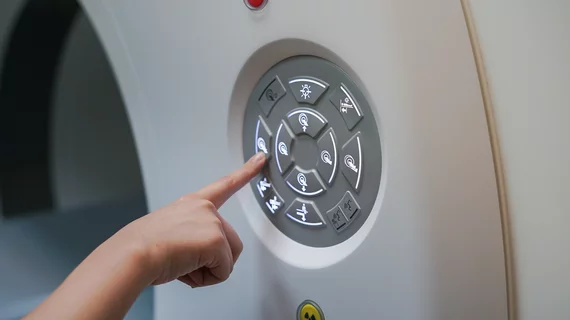Intel and Samsung improve fetal ultrasound, Konica Minolta’s teleradiology platform, and more radiology vendor updates
Intel and Samsung Medison—an affiliate of Samsung Electronics—announced a new collaboration Wednesday, focused on ultrasound workflow solutions to improve maternal and fetal safety.
The companies will incorporate Intel’s processing capabilities with Samsung’s BiometryAssistant and LaborAssist platforms to help save lives during childbirth. The latter technology helps physicians estimate the fetal angle of progression and head direction for optimal delivery. While the BiometryAssistant automates fetal measurements in nearly 85 milliseconds with 97% accuracy, according to the announcement.
“So it is useful for explaining to the patient and her family how the labor is progressing, using ultrasound images which show the change of head station during labor,” Min Jeong Oh, MD, PhD, with Korea University’s Department of Obstetrics and Gynecology, said in a statement. “It is expected to be of great assistance in the assessment of labor progression and decision-making for delivery.
Change Healthcare and Vizient strike a deal
Vizient has awarded Change Healthcare two new contracts that will give provider members access to the latter’s enterprise imaging and cardiology solutions, the pair announced Wednesday.
As part of the multi-year agreements, Nashville, Tennessee-based Change Healthcare will offer its vendor-neutral imaging archive, imaging analytics dashboard and artificial intelligence integration services to Vizient members. The latter bills itself as the largest healthcare purchasing group in the U.S., representing more than $100 billion in annual volume.
“With these agreements, the 95% of academic medical centers and more than 50% of acute care providers in the U.S. that are Vizient members can enjoy enhanced savings for Change Healthcare’s Enterprise Imaging and Hemodynamic solutions,” Aaron Green, senior vice president and chief growth officer, enterprise imaging at Change Healthcare, said in a statement.
Konica Minolta introduces remote reading platform
Konica Minolta Healthcare announced its Exa Gateway technology Thursday, geared toward radiology practices that need a secure remote reading platform.
The healthcare and imaging technology specialist said its service minimizes costs, improves connectivity and allows teleradiologists to use their existing PACS worklist.
“It is also a blueprint for the future of radiology reading, where teleradiology and remote reading will play a larger role especially as many communities and facilities address radiologist shortages and a lack of subspecialists in radiology,” Tim Kearns, strategic marketing manager, Healthcare IT, said in a statement.
More news
Below are a few additional radiology vendor updates:
- Artificial intelligence software company Lunit highlighted recent research demonstrating that its AI solution is as accurate as a radiologist in identifying breast cancer. Two recent studies published in JAMA Oncology and the Lancet Digital Health have the details.
- Carestream Health launched a breathable, lightweight personal face shield for providers on the frontlines of the pandemic. It’s available in two options and is meant to supplement other PPE.
- Nuance Communications and Meditech are partnering on a new virtual assistant to help physicians navigate and search patient charts in the electronic health record. Using Nuance’s existing technology, providers can seek out pertinent information such as images, lab results, medications and more.

